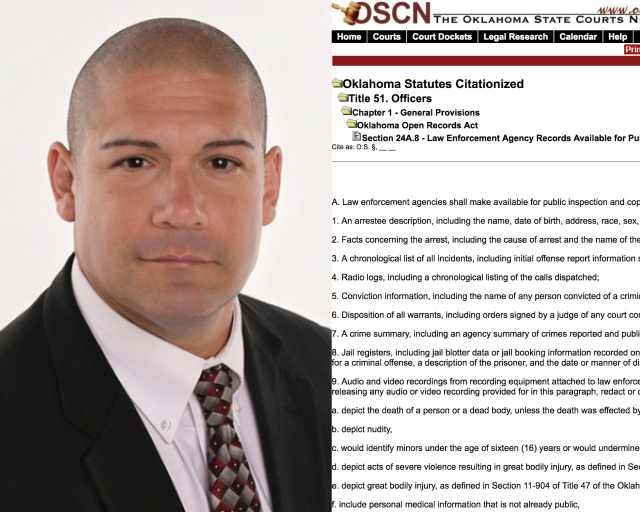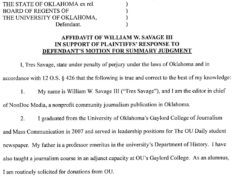
Tulsa County Sheriff Vic Regalado has been in his new job only a short time, but he’s already getting off on the wrong foot regarding transparency and public records.
The Tulsa Frontier is suing the decorated homicide detective-turned-sheriff for his office’s refusal to release videos related to inmates’ treatment at the Tulsa County Jail.
Regalado and his PIO, former TV reporter Casey Roebuck, are attempting to hide Tulsa County Jail videos from the public behind one specific section of the Oklahoma Open Records Act.
From an explanation of the Frontier’s lawsuit by editor in chief Ziva Branstetter:
When I asked Tulsa County Sheriff Vic Regalado for video showing how David Fulps wound up with a broken neck, back and pelvis in the jail, I already knew the answer.
“Jail surveillance video is not a law enforcement record subject to disclosure,” said the curt email on May 25 from Casey Roebuck, a Regalado spokeswoman and former KJRH reporter.
I knew the answer because that’s the same response I received May 2 from Regalado’s office.
That’s when The Frontier requested video of the jail pod where Nathan Bradshaw tried to hang himself. We wanted to see whether detention officers were checking on Nathan, a troubled young man who had struggled with drugs and stolen a textbook.
“As per your request regarding the Bradshaw case, jail surveillance video is not subject to open record requests per Oklahoma State Statutes,” Roebuck’s email states.
In both cases, we disagree with the sheriff. So we’re suing him today.
Agencies ‘may’ deny access
The Oklahoma Open Records Act contains language specifically pursuant to law enforcement entities, and quite often those entities attempt to hide behind that language to the public’s detriment. From Oklahoma Statutes Title 51, Section 24A.8:
B. Except for the records listed in subsection A of this section and those made open by other state or local laws, law enforcement agencies may deny access to law enforcement records except where a court finds that the public interest or the interest of an individual outweighs the reason for denial.
The word “may” offers one hell of an exemption, and it’s obvious why the statute doesn’t say “should” or “probably oughta.”
If you read the entirety of Section 24A.8, you’ll note that audio and video recordings made from law enforcement vehicles or from the bodies of officers are listed as open records.
Jail videos, however, are not explicitly listed as open records, and Regalado has apparently decided to dig a metaphorical trench around whatever server the jail uses to store surveillance footage. In doing so, he might as well post a sign saying, “If we have body-cam footage of an inmate being injured, we have to make that public, but if we have building-cam footage, well … go jump in a lake.”
Avoiding ‘transparency’ bad for the public
Since previous sheriff Stanley Glanz apparently did release jail videos upon public request, withholding the same type of record now is a bad precedent for Regalado to set, especially if “transparency” really is one of his goals for the TCSO.
But despite that singular tweet of the word, the concepts of transparency or accountability don’t seem to have appeared on Regalado’s campaign website.
In fact, aside from a “More Service, Less Politics” catchphrase, Regalado’s campaign site doesn’t list any “issues” important to him. Instead, it focuses entirely on Regalado himself, his awards and his family. (Nice pic in your NAIA college football jersey, sheriff. Congrats on that “Department Physical Fitness Award.”)
Nonetheless, the Frontier’s lawsuit against Regalado on the issue of jail videos should be important to watch, and not just for media.
Lawsuit speaks to need for open government
Too often, the public believes lawsuits like these are inside baseball; battles over whether a newspaper, TV station or website can get records to print for stories.
In reality, these sorts of battles strike at the heart of an open government by the people for the people. At the end of the day, it may not matter whether video of how David Fulps sustained a broken neck is ever published. That video must be considered a public record for the sake of Mr. Fulps and/or his family and the families of anyone else who ever enters a publicly funded jail for even five minutes.
In a day and age where the American public is just beginning to learn how many people die at the hands of — or in the custody of — law enforcement on a weekly basis, hiding behind one paragraph in Title 51 of Oklahoma statutes is a cowardly move for any law enforcement agent.
And believe us, Regalado is not alone in doing so. He’s just the one currently being sued to stop the madness.
In the end, if Vic Regalado can handle the heat of hunting down criminals in 81 Tulsa County homicides like he brags, he can surely stomach releasing basic videos and documents related to prisoners of the state.
Hasn’t anyone told him he’ll have to face the public when it’s time for re-election (later this year)?
That old football picture ain’t even all that cute.





















